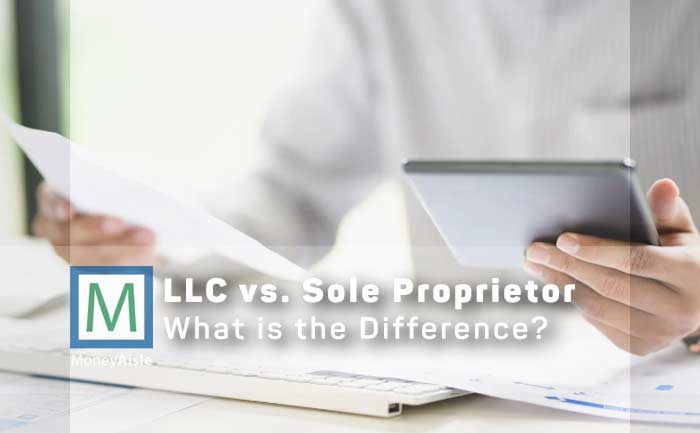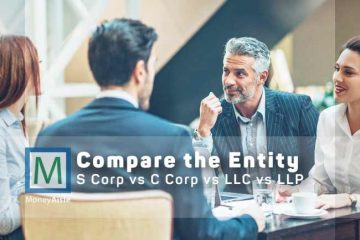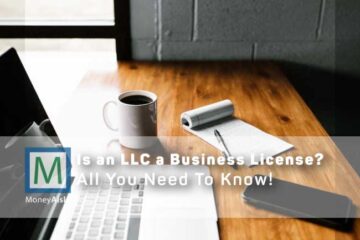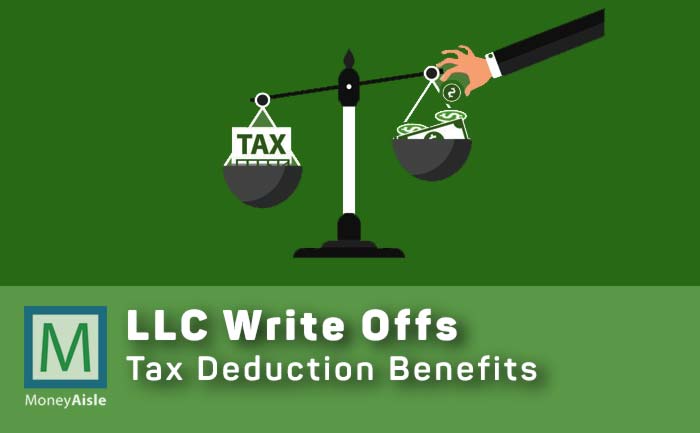This LLC vs. Sole Proprietorship article discusses the similarities between single-member LLC and Sole Proprietorship and how both business structures differ regarding legal protection, taxes, formation, and compliance formalities.

LLC vs. Sole Proprietorship: Learn the Similarities & Differences
Tip of the Day: Are you planning to convert your sole proprietorship into an LLC but feeling reluctant to register it by yourself? Hiring a reliable LLC formation service will help you file your LLC seemlessly and also save you from overspending.
Start an LLC Online Today with ZenBusiness ($0)
Select Your State Below to Start an LLC for $0 + the State Fees
Starting a new venture is exciting, but at the same time, it is challenging and full of responsibilities. Where a unique idea can help your business grow exponentially, a wrong entity structure could cause headaches and financial challenges in the days to come.
Therefore, selecting the best business structure is one of the most critical decisions for your entrepreneurial journey. The business ownership structure impacts your business significantly. It determines:
- The amount of liability protection your business has,
- The formation costs,
- How much taxes you’ll need to pay,
- The burden of state and local compliance requirements, and
- How easy or difficult it is to form your business.
In this LLC vs. Sole Proprietorship guide, we’ll compare and contrast two of the most popular business ownership structures: the single-member LLC and the sole proprietorship.
LLC vs. Sole Proprietorship | Side By Side Compersion
| Features | Sole Proprietorship | LLC |
| State Filling | No | Yes |
| Liability Protection | No | Yes |
| Ongoing Compliance | No | Yes |
| Tax Flexibility | No | Yes |
| Operation and Management | Easy | A bit complicated |
Sole Proprietorship vs LLC: What is the Difference?
The decision to incorporate or not to incorporate your business is not only challenging but has a lasting impact on the success of your business in the days to come. So, taking time for thorough research and measuring the pros and cons is the right thing to do.
Below is the overview of LLC and sole proprietorship in a few lines. Keep reading to know deeply about both business models and pick the most suitable structure for your business.
What is Sole Proprietorship
A sole proprietorship is the most common form of business ownership where no state filing is required. However, in a sole proprietorship, the business owner is personally liable for all debts and losses incurred by the business.
This means that if your business is sued or goes into debt, your personal assets (like your home, car, or savings account) will be liable for paying such business debts or lawsuits.
What is Limited Liability Company (LLC)
A limited liability company or LLC is a legal entity that requires paper filings with the state authorities. Once the LLC is legally formed, it shields your personal assets from business debts and lawsuits by providing limited liability protection similar to an S Corporation, C corporation, or LLP.
LLC vs Sole Proprietorship | Formation and Registration Costs
For entrepreneurs, the cost of business formation is one of the main considerations. This is how single and multi-member LLC differ from a sole proprietorship :
Sole Proprietorship Cost
A sole proprietorship is a default business structure that does not require your business to be registered. It’s easy to set up and requires very little paperwork. The cost to form a sole proprietorship is usually just the cost of obtaining a business license from your state or local government.
Limited Liability Company (LLC) Cost
LLCs typically have to file articles of organization with their state governments and may have to pay an LLC annual fee to remain in good standing. In some states, LLCs also have to file a statement of information and pay an annual registration fee. These fees can range from $50 to $500 per year.
LLC vs Sole Proprietorship | Limited Liability Protection
Personal asset protection is offered in LLC vs S Corp vs C corp vs LLP through the limited liability protection. This is one of the limited liability company characteristics which gives an LLC superiority over a sole proprietorship.
Sole Proprietorship: Liability Protection
As it is said, a sole proprietorship provides no legal protection for the business owner. This means that if the business is sued or has any debt, the owner of a sole proprietorship could be personally liable for damages and repaying the debt.
LLC: Liability Protection
An LLC shields the personal assets of its owners from business lawsuits, debts, and other liabilities by providing limited liability protection. This limited liability protection is similar to the liability protection provided by a corporation.
LLC vs Sole Proprietorship | Distinction Between Personal and Business Finance
Many businesses, especially the unincorporated ones, easily mix their business and personal finances. Though it seems convenient to use money from the personal account to cover business expenses and vice versa, it could be a hassle in the longer run.
Let’s see how LLC and sole proprietorship help sort business and personal finances:
Sole Proprietorship
In a sole proprietorship, the business and the owners are considered the same entity. So, there is no questioning from a legal standpoint when you mix personal and business finances. So, it seems pretty tempting that you can utilize personal funds for business when it is needed or the other way around.
Limited Liability Company (LLC)
Legally, an LLC is a separate entity from its owners. So, you must keep your personal and business finance sorted in separate accounts. In case you utilize funds from any of them, keep a record. This sorting will help you in LLC write-offs and seeking LLC business loans.
If you are not careful in keeping your business and personal finances separate, you may get in trouble and, worst case, lose your limited liability protection.
LLC vs. Sole Proprietorship Taxes | Tax Flexibility
Taxes are the most crucial consideration for any business structure. Most entrepreneurs prefer an entity structure that provides maximum tax benefit. Here is how LLC and sole proprietorship differ in tax structure:
Sole Proprietorship: Tax Flexibility
A sole proprietorship is taxed as an individual, where the tax is passed through to the individual income. This means that the owner of a sole proprietorship will pay taxes on their business income at their personal tax rate as a pass-through entity.
Limited Liability Company (LLC): Tax Flexibility
An LLC offers the most choices for Tax structure. There is no tax structure specified for LLCs by the IRS. So, an LLC has the liberty to be taxed as a pass-through entity like a sole proprietorship (or partnership in case of multi-member LLC), s corporation, or c corporation.
So as an LLC owner, you can freely choose the tax structure which suits the best in your personalized circumstances.
LLC vs Sole Proprietorship | Compliance and Ongoing Paperwork
Many business owners don’t like to indulge themselves in multiple compliance-related hassles. So before you choose an LLC or sole proprietorship, you must consider the amount of paper and compliance requirements needed in each business structure.
Sole Proprietorship: Complianc
Business license and local requirements for a specific business remain the same regardless of whether you choose a sole proprietorship or an LLC. There are no specific compliance requirements attached to a sole proprietorship.
Limited Liability Company (LLC): Complianc
After the LLC registration, California, Missouri, and New York makes it compulsory for LLCs to adopt an LLC operating agreement. Though it is not mandatory in other states, it is desirable to adopt some bylaws in the form of an operating agreement to avoid conflicts in day-to-day management, in the case of moving an LLC to another state or LLC dissolution.
An LLC has to submit an annual or biennial report to state authorities in addition to the specific business license or compliance requirement. Moreover, suppose your registered agent has changed its address, or you want to appoint a new registered agent. In that case, you must file an amendment in your articles of organization or request a change in registered agent to your state.
LLC vs Sole Proprietorship | Management and Operations
Every entrepreneur pays close attention to how day-to-day business operations will be handled and how to manage all the business affairs. Some want complete autonomy, while the others like someone else to handle their business affairs.
Here is how your business will be managed in a sole proprietorship:
Sole Proprietorship: Management
Since there is a sole owner in a sole proprietorship, you will have complete liberty over all important business decisions. You may hire other professionals to help you manage your business, such as accountants, bookkeepers, legal experts, or other employees. However, your decision will be considered the ultimate without the involvement of any third party.
Limited Liability Company (LLC): Management
In a single-member LLC, you are the only LLC member and have the freedom to make decisions for your company. You may also hire an LLC manager to look after your business affairs related to finance, employees, etc. See how Member Managed LLC vs Manager Managed LLC works.
LLC vs Sole Proprietorship | How to Choose the Best Structure
Well, there is no hard and fast rule regarding which structure is the best for your business. As no size fits all, there is no one such business structure to fulfill the personalized needs of every entrepreneur.
Given your specific circumstances and future goals, you must decide which structure works best. Even if your needs or goals change in the future, you can always switch to another business structure anytime.
Below are given the pulse and downsides of a sole proprietorship and LLC. You can choose the structure which offers the most benefits and minimum hassles.
Advantages and Disadvantages of a Sole Proprietorship
Advantages and Disadvantages of an LLC
LLC vs Sole Proprietorship FAQs
Can you convert a sole proprietorship to an LLC?
Yes, it is a very easy and quick process. Since a sole proprietorship is a default business structure, you simply need to start an LLC by registering it with your state to convert your sole proprietorship to an LLC. You can also take help formation services like ZenBusiness, IncFile, or Northwest registered Agent to save yourself from the hassle of paperwork.
How do you decide between sole proprietorship and LLC?
Both LLC and sole proprietorship have their advantages and disadvantages. So, if you prefer to protect your personal assets from business debts and liabilities, you can choose a limited liability company. However, if you do not want to register your business and are not interested in ongoing compliance and paperwork, you can go with the sole proprietorship.
Why would you choose an LLC over a sole proprietorship?
A limited liability company or LLC offers personal asset protection by providing a limited liability feature. So, if your business faces unforeseen circumstances and is unable to pay its debt or liability, LLC will provide a shield against business liabilities. Therefore, you should choose an LLC over a sole proprietorship.
Do you need to register your business name?
As a sole proprietorship, if you want to operate under a business name other than your own name, you must register a business name called Doing Business As (DBA) or trade name.
LLC provides you with an opportunity to register a business name other than your own name when you file your LLC article of organization. However, if you take a franchise, you may need to file a DBA. read when and how to file a DBA in all 50 states in this article.
Can you convert an LLC to a sole proprietorship?
Yes, you can convert an LLC to a sole proprietorship. For that, you need to dissolve your LLC by following your operating agreement. You must obtain consent from all LLC members for LLC termination and distribute LLC assets as dictated in the LLC bylaws. Then you need to file articles of dissolution with the state and may publish the LLC dissolution notice in the local newspaper.
Once the LLC is dissolved, you may continue your business operations. Now your business is in the default state which is called a sole proprietorship.
Why is an LLC the best?
A limited liability company or LLC offers personal asset protection by providing a limited liability feature, offers the most tax flexibility and ownership freedom, and requires fewer formalities. That is why LLC is the preferred business structure over a sole proprietorship, S or C corporation, or LLP.

Aisha Noreen is an owner of a small business with more than 9 years of experience in the marketing industry. With the wisdom of an old soul, she always seeks innovation and mind-blowing ROI techniques. Her unique approach helped many small businesses thrive and she can surprise you in many ways as well. Believe it or not, her energy, passion, and creativity are contagious enough to transform your business and take it to another level.








